
A New Look At Prayer
A Deeper Understanding of this Crucial Responsibility
Do we fully understand the reality of perhaps the most important responsibility that we as Christians must practice? That responsibility is to pray to our Creator, the One who made us, alongside studying His word, meditating upon His ways, and fellowshipping with other brethren. It stands to reason that we need to carefully examine this most critical responsibility we have, and understand it forwards and backwards. It is so integral a part of our Christian walk!
What is prayer? I love the definition given by Noah Webster in his famed 1828 American Dictionary of the English Language (Foundation for American Christian Education, San Francisco, California, 1995):
1. To ask with earnestness or zeal, as for a favor, or for something desirable; to entreat; to supplicate.
2. To petition; to ask, as for a favor.
3. In worship, to address the Supreme Being with solemnity and reverence, with adoration, confession of sins, supplication for mercy, and thanksgiving for blessings received.
We can condense this definition for our purposes to the simple, “communicating with God,” in any manner we might employ. Prayer can be described as a pipeline to our Creator of whatever need or desire we might have, or giving praises and thanksgiving to Him for some deed He has done for us. Prayer is likened to the smoke from incense on the altar, as Revelation 8:4 plainly states: “And the smoke of the incense, together with the prayers of the saints, rose up before God from the hand of the angel” (Berean Standard Bible), and as Psalm 141:2 confirms, “May my prayer be set before You like incense; my uplifted hands, like the evening offering.” The four living creatures and the 24 elders in Revelation 5:8 each held golden bowls full of incense, “… which are the prayers of the saints.”
The Incredible Power of Prayer
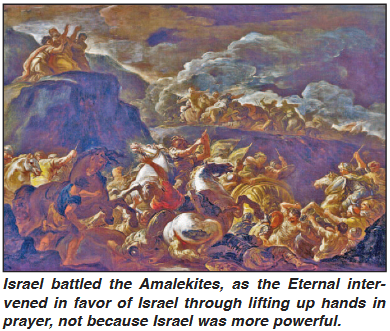 Prayer can move mountains — literally — if that is God’s will. Jesus told His disciples that if they had faith like a tiny mustard seed they could say to a mountain, “Move from here to there,” and it would move. Nothing would be impossible for them (Matthew 17:20). Of course, that statement is a request to the Eternal, a prayer to the One who makes all things possible. Prayer and faith go together. The actual mechanics by which this can happen will be touched upon later in this discussion.
Prayer can move mountains — literally — if that is God’s will. Jesus told His disciples that if they had faith like a tiny mustard seed they could say to a mountain, “Move from here to there,” and it would move. Nothing would be impossible for them (Matthew 17:20). Of course, that statement is a request to the Eternal, a prayer to the One who makes all things possible. Prayer and faith go together. The actual mechanics by which this can happen will be touched upon later in this discussion.
1. Prayer can literally change the outcome of battles. As Solomon said, “The race is not to the swift, nor the battle to the strong” (Ecclesiastes 9:11). It is God who determines the victor in a contest, be it in military campaigns, in political contests, or in court cases. In Exodus 17:8-13 we read how Israel battled Amalek, and Moses walked to a hilltop to plead with Yahweh for Israel’s deliverance. When Moses’ hands were raised Israel prevailed, but in time he dropped his arms in exhaustion. Thereupon Amalek began to prevail in the battle. To enable Israel to be victorious, Aaron and Hur lifted up Moses’ arms so that Israel would secure the victory, a powerful illustration of how sustained prayer can change the tide of warfare.
Similarly, King Jehoshaphat, when faced with an opposing army of Moabites, Ammonites, and others far greater than his own, led his people in prayer to somehow overcome this hopeless situation. We read in II Chronicles 20:1-25 how Yahweh responded by declaring:
“Thus says the Lord God to you: ‘Do not be afraid nor dismayed because of this great multitude, for the battle is not yours, but God’s’” (verse 15).
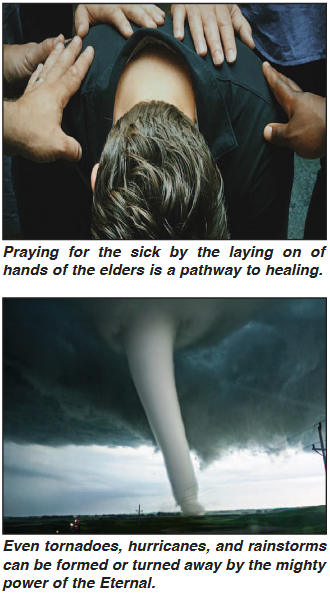 Then Yahweh set ambushes against the armies of Ammon, Moab, and Seir, and those armies were defeated. The Ammonite and Moabite armies consequently destroyed the army of Seir, and finally turned upon each other. All of the enemy was destroyed!
Then Yahweh set ambushes against the armies of Ammon, Moab, and Seir, and those armies were defeated. The Ammonite and Moabite armies consequently destroyed the army of Seir, and finally turned upon each other. All of the enemy was destroyed!
2. Prayer brings healing to the sick, even to the dead! We read of King Hezekiah in II Kings 20:1-7 who was diagnosed by Isaiah with an incurable boil; he would die. Fearing death, Hezekiah turned to the wall and prayed for healing, and before Isaiah had reached the middle court he was told to return to Hezekiah and tell him he would be given 15 more years of life. Thereafter they laid a clump of figs on the boil and Hezekiah was healed.
Many other Scriptures tell of healings through prayer, such as the widow’s son whom Elijah concertedly prayed over and brought up from the dead (I Kings 17:17-24). Similarly Peter prayed for the healing of Dorcas, a dedicated disciple whose revival became a testimony to the power of God’s spirit (Acts 9:36-42). Recall the instructions Paul gave in James 5:14-16:
“Is anyone among you sick? Let him call for the elders of the church, and let them pray over him, anointing him with oil in the name of the Lord. And the prayer of faith will save the sick, and the Lord will raise him up. And if he has committed sins, he will be forgiven.”
3. Prayer alters the weather, and even the cosmos! Elijah is recorded to have prayed for it not to rain for three and a half years; then he prayed again, and the rains returned and the soils grew their crops (James 5:17-18). In the midst of a crucial battle with the Amorites, Joshua prayed for the sun to stand still so Israel could defeat the five kings. It “. . . stood still in the midst of heaven and did not hasten to go down for about a whole day” (Joshua 10:12-14). It is stated in verse 14 that Yahweh heeded the voice [prayer] of a man that day, and actually changed the heavenly powers as a result!
Jesus commanded a furious storm to cease when the waves threatened to sink the boat they were in (Mark 4 :35-41). I have personally witnessed the powers of heaven altered by prayer several times. One day during a serious drought on our family’s farm in southwestern Minnesota, the forecast was for a 0% chance for rain, but a powerful thunderstorm built up a short distance to the west of our farm, moved over our fields and rained abundantly; the storm dissipated as quickly as it had formed a few miles to the east. Amazingly the same scenario happened the very next day, again when no rain had been forecast!
4. Prayer transforms hearts. Let me mention my own faults as a youth and young man. I was very impatient and unthankful, and fearful of crowds. After years and years of prayer to overcome these stains on my character, I can testify that these ungodly traits have been largely crucified due to the power of God’s spirit.
Notice the remarkable conversion of Saul, who was a strong persecutor of the early ecclesia. In Acts 9:10-18 we read that Ananias prayed for the healing of Saul’s eyesight, and his sight was restored. Moreover, Saul — whose name was changed to Paul — had been praying as well, likely to have his sight restored and to understand what was expected of him to do now that he had been totally humbled by God. Prayer totally changed Paul’s heart, to follow in Christ’s footsteps.
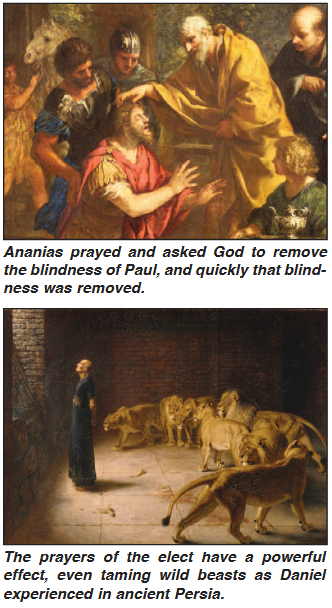 The early ecclesia prayed for boldness to counter the threats and persecution of the Pharisees and others trying to stifle the spread of the truth about the resurrection of Christ. In one instance, after the disciples had prayed, the place of their assembly was shaken. So powerful was the holy spirit to grant the disciples boldness (Acts 4:23-31).
The early ecclesia prayed for boldness to counter the threats and persecution of the Pharisees and others trying to stifle the spread of the truth about the resurrection of Christ. In one instance, after the disciples had prayed, the place of their assembly was shaken. So powerful was the holy spirit to grant the disciples boldness (Acts 4:23-31).
5. Prayer gives divine protection. Perhaps no better example of such protection can be found than that of Daniel being thrown into the lions’ den. Despite the King’s decree that no one could pray to anyone but the king without facing death in the lions’ den, Daniel continued his prayers to Yahweh three times a day. When accused of disobeying the king’s order, Darius reluctantly had him cast among the lions, but Daniel was protected all night. Then the tables were turned and Daniel’s accusers were thrown amongst the lions and torn to bits (Daniel 6:10-13). Daniel’s prayers prevailed, and the lions’ mouths were sealed.
Note also the case of Peter, who was cast into prison by Herod after James had been killed. The brethren prayed earnestly for Peter’s deliverance that night:
“Now behold, an angel of the Lord stood by him, and a light shone in the prison; and he struck Peter on the side and raised him up, saying, ‘Arise quickly!’ And the chains fell off his hands” (Acts 12:7).
The angel led Peter out through the gate, which opened on its own accord, and he joined some brethren in a house nearby. Those prayers literally broke through physical barriers and freed a servant of the living God who might have otherwise been killed. The Eternal had more jobs for Peter to complete.
6. Prayer provides divine guidance. We read of Gideon’s calling to head up Israel’s army in Judges 6: 36-40. Gideon challenged God to prove that He would save Israel through his leadership by causing dew to collect on a fleece, but not on the ground. Then he reversed the situation to ask that God would bring dew on the ground, but not on the fleece. God’s answers proved to Gideon that Israel would be delivered, and he could move forward with confidence in heading up the army.
In Acts 1:23-26, a replacement for Judas Iscariot was guided by heartfelt prayer:
“And they prayed and said ‘You, O Lord, who knows the hearts of all, show which of these two You have chosen to take part in this ministry and apostleship from which Judas by transgression fell, that he might go to his own place’” (Acts 1:24-25).
The eleven apostles cast lots, and the lot fell on Matthias. Rather than use human wisdom to select a replacement for Judas, they looked towards God to provide the answer.
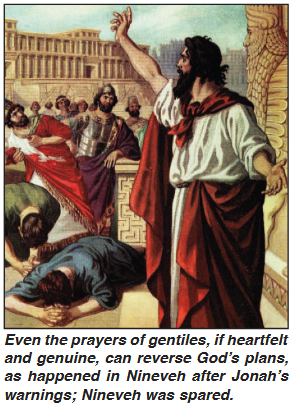 7. Prayer can reverse divine judgment. When the Israelites had made the molded calf at Mount Sinai, Yahweh proclaimed He would destroy them all and make a great nation from Moses. Moses pleaded with Yahweh to relent from this threat, reminding Him that the Egyptians would claim that He brought Israel out of Egypt to kill them in the mountains, and He would not be able to multiply them greatly and give them all the land He had promised to Abraham, Isaac, and Jacob as an inheritance forever (Exodus 32:7-14). Because of Moses’ reasoning with the Eternal — which can be likened to prayer — Israel was saved from annihilation.
7. Prayer can reverse divine judgment. When the Israelites had made the molded calf at Mount Sinai, Yahweh proclaimed He would destroy them all and make a great nation from Moses. Moses pleaded with Yahweh to relent from this threat, reminding Him that the Egyptians would claim that He brought Israel out of Egypt to kill them in the mountains, and He would not be able to multiply them greatly and give them all the land He had promised to Abraham, Isaac, and Jacob as an inheritance forever (Exodus 32:7-14). Because of Moses’ reasoning with the Eternal — which can be likened to prayer — Israel was saved from annihilation.
Then there is the case of Nineveh being consigned to destruction because of the wickedness of the inhabitants. A reticent Jonah entered the city and proclaimed, “Yet 40 days and Nineveh shall be overthrown!” (Jonah 3:4). Thereupon the people of Nineveh believed Jonah’s message and repented, put on sackcloth, fasted, and cried mightily to God that His fierce anger would be turned away. When God saw that the people turned from their evil ways, He “… relented from the disaster that He had said He would bring upon them, and He did not do it” (Jonah 3:10). Prayers can reverse God’s proclamations if the people upon whom the judgment is pronounced will repent of their evil ways.
Prayer can do many marvelous things, such as the following:
Prayer provides needful things (Psalm 102:17; Matthew 7:7-8).
Prayer defeats evil and the power of Satan (I Peter 4:7).
Prayer forgives sinners (Luke 18:13; Romans 10:13).
Prayer strengthens us (Jude 20).
Prayer enables laborers in the faith to be sent (Matthew 9:38).
Prayer protects you from sin (Matthew 26:41).
Prayer can result in the impossible being accomplished (Matthew 21:22).
Prayer reveals God’s will (Colossians 4:12; Luke 11:9-10).
Prayer imparts wisdom (James 1:5).
Prayer grants peace (Philippians 4:5-7).
Prayer glorifies God (Revelation 5:8; 8:24).
Prayer assists others in need (II Corinthians 1:11).
Prayer creates a hedge of protection (Nehemiah 4:9).
Prayer heals and demonstrates God’s power (I Kings 17: 21-22).
When Should We Pray?
Since prayer is communication with God, and we wish to always be in contact with our Creator, in a real sense we should always be praying, or be ready to cry out to the Eternal at a moment’s notice. Romans 12:12 makes plain that we should “… rejoice in hope, patient in tribulation, continuing steadfast in prayer …” The King James Version translates the Greek word proskartereo as instant here, instead of steadfast, the meaning being “earnest toward, to persevere, be constantly diligent.” We need to always be ready to speak with our Creator in good times or in difficult times, for as James stated:
“Is anyone among you suffering? Let him pray. Is anyone cheerful? Let him sing psalms” (James 5:13).
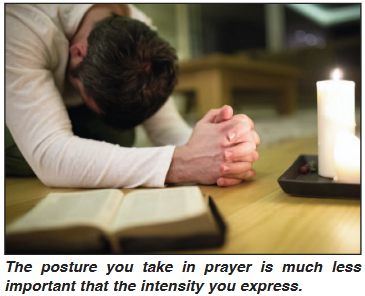 Singing a song is akin to praying in itself, in that the words are glorifying and praising God in song after rather than in speaking. But it is especially noteworthy that James made a point to indicate the need to pray when suffering. Trials and pain of spirit draw one closer to the Creator, even as fasting humbles the spirit and brings a person closer to one’s Maker.
Singing a song is akin to praying in itself, in that the words are glorifying and praising God in song after rather than in speaking. But it is especially noteworthy that James made a point to indicate the need to pray when suffering. Trials and pain of spirit draw one closer to the Creator, even as fasting humbles the spirit and brings a person closer to one’s Maker.
It is wise to make it a habit of praying at specific times, such as in the morning after rising from sleep, or at some other times during the day. Daniel habitually prayed three times a day:
“And in his upper room with his windows open towards Jerusalem, he knelt down on his knees three times a day, and prayed and gave thanks before his God as was his custom since early days” (Daniel 6:10).
This habit was practiced also by king David, who stated that he prayed three times a day — evening, morning, at noon — and he would even “cry aloud” to God as he prayed (Psalm 55:17). While setting aside specific times for prayer is important, there will be times when a person needs to talk with one’s Creator urgently due to circumstances that suddenly arise, such as voiced by Cyrus Brown in Sam Walter Foss’ poem (www.best-poems.net):
“The proper way for a man to pray,” said Deacon Lemuel Keyes, “and the only proper attitude is down upon his knees.”
“Nay, I should say the way to pray,” said Reverend Dr. Wise, “is standing straight with outstretched arms and rapt and upturned eyes.”
“Oh, no, no, no,” said Elder Snow. “Such posture is too proud. A man should pray with eyes fast closed and head contritely bowed.”
“It seems to me his hand should be astutely clasped in front, with both thumbs pointing toward the ground,” said Reverend Hunt.
“Las’ year I fell in Hodgkins well headfirst,” said Cyrus Brown, “With both my heels a-stikin’ up, my head a-p’inting down. An’ I made a prayer right there an’ then, best prayer I ever said; The prayingest prayer I ever prayed, a-standin on my head.”
The apostles made it a habit to pray as the spirit of God moved them (Acts 10:9), and there were even places where brethren met to pray, as when Paul met with some women by a river outside of Philippi (Acts 16:13). These references prove that communication with the Creator must occur regularly each day, and whenever a crisis or need arises.
It cannot be emphasized enough that it is essential to remain righteous in God’s eyes in order for your prayers to be heard. Note the following Scriptures:
“The Lord is far from the wicked, but he hears the prayers of the righteous” (Proverbs 15:29).
“The eyes of the Lord are on the righteous, and His ears are open to their cry. The face of the Lord is against those who do evil, to cut off the remembrance of them from the earth” (Psalm 34:15-16).
“Behold, the Lord’s hand is not shortened, that it cannot save; nor His ear heavy that it cannot hear. But your iniquities have separated you from your God and your sins have hidden His face from you, so that He will not hear” (Isaiah 59:1-2).
“‘To what purpose is the multitude of your sacrifices to Me?’ says the Lord. ‘I have had enough of burnt offerings of rams and the fat of fed cattle. I do not delight in the blood of bulls, or of lambs or goats …. When you spread out your hands, I will hide My eyes from you; even though you make many prayers, I will not hear. Your hands are full of blood” (Isaiah 1:11,15).
“Now we know that God does not hear sinners; but if anyone is a worshiper of God and does His will, He hears him” (John 9:31).
How to Pray
The poem of Cyrus Brown above suggests several postures for prayer, but emphasizes the need to be “instant” in prayer as the situation dictates. Nonetheless, Daniel’s daily prayers on his knees indicates a position that always qualifies as proper. Resting on one’s knees conveys an attitude of humility and supplication, whether to the Creator or to anyone else. Servants and captives throughout history would show their subservience to someone by kneeling before them.
Lifting up arms towards heaven was a practice Paul apparently exercised regularly when he stated in I Timothy 2:8, “I desire therefore that the men pray everywhere, lifting up holy hands, without wrath and doubting ….” Of course, lifting your hands up towards heaven cannot be sustained indefinitely — muscles get tired — but it indicates a spontaneous zeal for answers from the Creator.
One can outline the principal guidelines to effective prayer, which include praying with faith, sincerity, fervor, specificity, and humility. Let us briefly address each of these.
1. Our prayers are to be addressed directly to the Father, as clearly stated in the model prayer in Matthew 6:9).
“In this manner, therefore, pray: Our father in heaven, hallowed be Your name” (Matthew 6:9).
Those prayers are lifted up to our Maker with no human between you. However, we do have a Mediator, Jesus Christ, who “… makes intercession for us with groanings [stanagmos, ‘a sigh, groaning’] which cannot be uttered” (Romans 8:26). Then Paul goes on to explain how Jesus “searches our hearts” to know what is transpiring within our minds, and “ … He makes intercession for the saints according to the will of God” (verse 27).
2. Pray with faith. Without faith in God’s promises it is impossible to please Him in anything (Hebrews 11:6). You must believe He is who He says He is, and that He will do what He says He will do. To have a view of who your Creator really is is critical when talking with Him; the better you know Him — His character and personage — the better you can communicate, like talking to a friend, as Abraham and Moses spoke with God. The Father’s appearance is mentioned in Ezekiel 1:
“And above the firmament over their heads was the likeness of a throne, in appearance like a sapphire stone; on the likeness of the throne was a likeness with the appearance of a man high above it. Also from the appearance of His waist and upward, I saw as it were the color of amber with the appearance of fire all around within it; and from the appearance of His waist and downward I saw, as it were, the appearance of fire with brightness all around. Like the appearance of a rainbow in a cloud on a rainy day, so was the appearance of the brightness all around it. This was the appearance of the likeness of the glory of the Lord” (Ezekiel 1:26-28).
The appearance of the glorified Jesus Christ likely simulates that of the Father — like father, like son — and Jesus said, “Anyone who has seen Me has seen the Father” (John 14:9). We read in Revelation 1:
“… and in the midst of the seven lampstands One like the Son of Man, clothed with a garment down to the feet and girded about the chest with a golden band. His head and hair were white like wool, as white as snow, and His eyes like a flame of fire. His feet were like fine brass as if refined in a furnace, and His voice as the sound of many waters” (Revelation 1:13-15).
 The character of the Father and Son are perfect, sinless, and loving beyond belief, personified in the fruits of the spirit (Galatians 5: 22-23). By praying in faith we trust that He is who He says He is, He hears us when we pray, He loves us, has a detailed plan of life for us, and we expect Him to answer what we ask of Him.
The character of the Father and Son are perfect, sinless, and loving beyond belief, personified in the fruits of the spirit (Galatians 5: 22-23). By praying in faith we trust that He is who He says He is, He hears us when we pray, He loves us, has a detailed plan of life for us, and we expect Him to answer what we ask of Him.
3. Pray with sincerity. We must be honest and transparent before our Creator, for He sees into every hidden corner of our mind:
“For the word of God is living and powerful, and sharper than any two-edged sword, piercing even to the division of soul and spirit, and of joints and marrow, and is a discerner of the thoughts and intents of the heart” (Hebrews 4:12).
We ought to share our joys, sorrows, hopes, and dreams, and confess our sins and ask for forgiveness. We need to admit our weaknesses and ask for His presence in every aspect of our lives, hiding nothing from Him.
4. Pray with intensity. You must put your whole being into your prayers and really mean what you ask. Note these Scriptures that solidify this point:
“‘For I know the thoughts that I think towards you,’ says the Lord, ‘thoughts of peace and not of evil, to give you a future and a hope. Then you will call upon Me, and go and pray to Me, and I will listen to you. And you will seek Me and find Me, when you search for Me with all your heart’” (Jeremiah 29:11-13; see also Jeremiah 24:7).
“Now it shall come to pass, when all these things come upon you, the blessing and the curse, which I have set before you, and you call them to mind among all the nations where the Lord your God drives you, and you return to the Lord your God and obey His voice, according to all that I command you today, you and your children, with all your heart and with all your soul … “ (Deuteronomy 30:1-2).
To reach this intensity you must truly know your Creator in heaven, the One that made you, for how can you speak in sincerity, truth, and energy if you have no clear conception of who He is? We spoke earlier a bit about what God looks like on His throne in heaven, but far beyond that conception we must know His perfection and love for us. He truly loves us (Romans, 5:8; 8:35, 39; Ephesians 5:2; II Thessalonians 2:16; I John 3:1; 4:9-19) and deeply cares for us (I Peter 5:7; Psalm 55:22; Hebrews 13:5). His personality is epitomized by love, joy, peace, longsuffering, kindness, goodness, faithfulness, gentleness, self-control, and humility (Galations 5:22-23).
“The effective fervent [energeo, ‘ to be active, efficient’] prayer of a righteous man avails much” (James 5:16). Energy and effort are required to achieve that deep personal relationship we desire with our Creator, the same energy and effort that He extends to you when you seek Him with your whole heart.
Fasting helps attain this energeo, which appears to be a contradiction because without food and drink the body grows weaker. Yet, when deprived of physical nourishment the mind grows sharper, and humility increases such that one is able to fulfill the very purpose of fasting (Isaiah 58:6-7):
Loose the bonds of wickedness
Undo heavy burdens
Let the oppressed go free
Break every yoke
Share your food with the hungry
Shelter the poor and homeless
Clothe the naked
Attend to your family
The result of a proper fast will bring about these ends. We must not forget that prayer goes along with fasting, so clearly pointed out in Nehemiah 1:4; Psalm 35:13; Daniel 9:3; Matthew 17:21; Mark 9:29; Luke 2:37 and 5:33; Acts 10:30; 13:3, and 14:23; I Corinthians 7:5. Fasting multiplies the effectiveness of prayer.
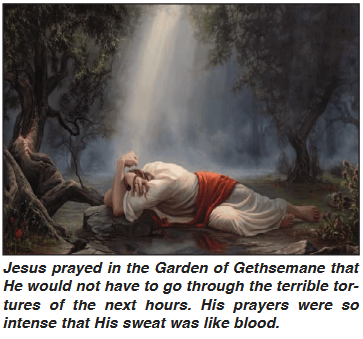 Jesus Christ, the night before the crucifixion, when He was praying in private in the garden of Gethsemane, prayed that He would not have to endure the crucifixion, and an angel arrived to strengthen him:
Jesus Christ, the night before the crucifixion, when He was praying in private in the garden of Gethsemane, prayed that He would not have to endure the crucifixion, and an angel arrived to strengthen him:
“And being in agony [agonia, “a struggle’], He prayed more earnestly [ektenesteron, ‘more intently’]. Then His sweat became like great drops of blood falling down to the ground” (Luke 22:44).
Jesus’ distress with the oncoming crucifixion was so intense that He quite literally “sweated blood,” as it were, or perhaps secreted albumin into his sweat glands. The trauma of the upcoming trial drove Him to intense conversation with His Father, whom He knew intimately, whom He spoke with throughout His life.
To accentuate our intensity in prayer we must have a vision of what our lives are destined to be: Kings and Priests to reign with Christ on the earth for 1,000 years (Revelation 5:10; 20:4). Possessing a vivid vision of what is coming to earth — a reinstatement of Eden on a worldwide scale — and the incredible beauty, peace, and productivity that will entail, you can intensely pour yourself into your prayers, knowing your incredible future is worth sacrificing everything for. As Peter stated at the first Pentecost:
“Repent therefore, and be converted, that your sins may be blotted out, so that the times of refreshing may come from the presence of the Lord, and that He may send Jesus Christ who was preached to you before, whom heaven must receive until the times of restoration of all things, which God has spoken by the mouth of all His holy prophets since the world began” Acts 3:19-21).
Peter understood the importance of knowing that Jesus Christ was indeed returning to the earth at the end of this age to restore the earth to Edenic perfection. That vision would grant hope and purpose to all of those who would repent and be converted, whose sins were blotted out, and who would pray diligently for the kingdom to come.
5. Pray with specificity. Prayers need to be directed in detail towards the people and situations of concern. We must ask God what is wanted according to His will, while we seek the outcomes we desire. Note several examples of the prayers Jesus offered, conversations with the Father that were totally selfless and directed toward the uplift of others.
Pray for those who spitefully use and persecute you (Matthew 5:44; Luke 6:28).
Pray that God would send laborers to the harvest (Matthew 9:37-38; Luke 10:2).
Pray for casting out demons (Matthew 17:21; Mark 9:29).
Pray for blessings upon children (Matthew 19:13).
Pray for anything that is needed, in faith (Matthew 21:22; Mark 11:24).
Pray for relief in times of testing (Matthew 26:36-44; Mark 14:32-39; Luke 22:40-44).
Pray for help from angels (Matthew 26:53).
Pray for healing (Mark 5:20).
Pray to escape the coming tribulation (Luke 21:36).
These prayers all asked the Father for specific things. They were heartfelt and sincere, and were always answered. You must focus on what is needed and let the Father take care of the rest.
6. Pray with humility. For prayers to be heard by the Father they must come from a humble heart:
“‘For all these things My hand has made, and all those things exist,’ says the Lord, ‘But on this one will I look, on him who is poor and of a contrite spirit, and who trembles at My word’” (Isaiah 66:2).
poor = aniy, “depressed in mind or circumstances”; nearly the same as anav, which is often translated “humble.”
contrite = nakeh, “smitten, i.e. maimed or dejected.”
“When He avenges blood, He remembers them; He does not forget the cry of the humble [aniy]” (Psalm 9:12).
“The righteous cry out, and the Lord hears, and delivers them out of all their troubles. The Lord is near to those who have a broken heart, and saves such as have a contrite spirit” (Psalm 34:17-18).
broken = shabar “to burst (literally or figuratively).”
heart = labe, “the heart, the feelings, the will or intellect.”
contrite = dakka, “crushed” from daka, “crumble, to bruise (literally or figuratively).”
“The Lord is near to all who call upon Him, to all who call upon Him in truth. He will fulfill the desire of those who fear Him. He also will hear their cry and save them” (Psalm 145:18-19).
It is easier to pray diligently and employ the Creator when you are crushed and humbled in spirit, as James so clearly said in James 5:13: “Is anyone among you suffering? Let him pray.” Likewise, as we have already seen, when fasting and under physical duress it is easier to be close to God and to pray. When humbled you recognize your total dependence on Him, and your acceptance of whatever answer He will give you. As a broken vessel of His making, you submit to Him with great awe and respect.
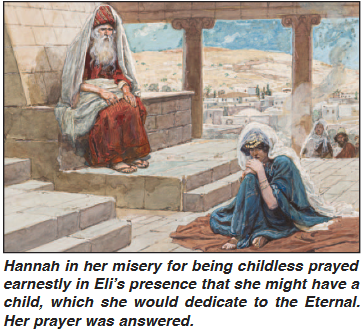 Answers to Prayer
Answers to Prayer
Notice some of the answers to prayer that are recorded in Scripture.
Hannah. in I Samuel 1 we read of Hannah’s great grief in failing to conceive a child, and of her heartfelt prayers at Shiloh, asking for a male child whom she would give to Yahweh as a Nazarite:
“And she was in bitterness of soul, and prayed to the Lord and wept in anguish …. But Hannah answered [Eli] and said, ‘No my lord, I am a woman of sorrowful spirit. I have drunk neither wine nor intoxicating drink, but have poured out my soul before the Lord. Do not consider your maidservant a wicked woman. for out of the abundance of my complaint and grief I have spoken until now.’ Then Eli answered and said, ‘Go in peace, and the God of Israel grant your petition which you have asked of him’” (I Samuel 1:10, 15-17).
Yahweh remembered Hannah, and saw not only her pure desire to be a mother but also her intent to be a faithful servant of God. It was because of God’s favor and Hannah’s arduous prayer that Samuel was born. Samuel would go on to be one of the greatest prophets of the Old Testament. In I Samuel 3:19 we read that not a single one of Samuel’s words dropped: his discernment in hearing God was without compare. Samuel also would be the prophet to crown not only the first king of Israel — Saul — but also the king after God’s own heart — David. Hannah’s prayer that day in Shiloh changed the course of history!
Daniel. We have already covered the episode of Daniel praying three times a day, his being accused before Darius for submitting to someone other than the king, and the closing of the lions’ mouths when cast into the den of lions. Being a man of prayer he had countless prayers answered during his lifetime, but one event was especially noteworthy in the third year of Cyrus’ reign in Persia. A message or vision was revealed while he was mourning and fasting about for three weeks, when he met an awesome spirit being who revealed understandings of his vision:
“Suddenly, a hand touched me, which made me tremble on my knees and on the palms of my hands. And he said to me, ‘O Daniel, man greatly beloved, understand the words that I speak to you, and stand upright, for I have now been sent to you.’ While he was speaking this word to me, I stood trembling. Then he said to me, ‘Do not fear, Daniel, for from the first day that you set your heart to understand, and to humble yourself before your God, your words were heard; and I have come because of your words” (Daniel 10:10-12).
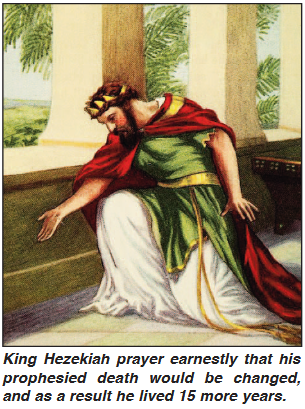 Because of Daniel’s fasting and prayers, the meeting with this magnificent spirit being who revealed deep understandings of prophecies was granted. Because of that we have Daniel’s prophecies with us to this very day.
Because of Daniel’s fasting and prayers, the meeting with this magnificent spirit being who revealed deep understandings of prophecies was granted. Because of that we have Daniel’s prophecies with us to this very day.
Hezekiah. As discussed earlier, Hezekiah was near death when Isaiah met him, and told him to set his house in order. However, Hezekiah turned his face toward the wall and prayed:
“‘Remember now, O Lord, I pray, how I have walked before You in truth and with a loyal heart, and have done what is good in your sight.’ And Hezekiah wept bitterly. And it happened, before Isaiah had gone out into the middle court, that the word of the Lord came to him …” II Kings 20:3-4).
Isaiah immediately returned to Hezekiah’s bedside and said that God had heard his prayer. He was healed of the boil with a lump of figs, and lived 15 years more.
My personal experiences. One day while I walked to the campus of North Dakota State University, while working on my doctor’s degree, for some reason I lifted up a prayer to the Creator that I might come to understand how business is conducted in this multinational society. My training was in science, not politics and economics, and I wanted this gap in understanding of how the world works to be filled. What has happened since that fateful day in the late 1970s has been an answer to that simple prayer: my work as a researcher and consultant in biological agriculture has brought me into contact with governments, businessmen, and trading firms that span the globe as I traveled to many countries, observing how they shipped and marketed their products. It has been a truly eye-opening revelation to see up-close the workings of modern Babylon the Great, prophesied to rule in the end time, where the transoceanic shippers are called the great men of the earth (Revelation 18:23).
In addition, the prayers of my wife and myself, to have revealed to us the true faith of the modern-day ecclesia, have been answered in most profound ways. We have been released from the grip of traditions of Protestant and Catholic theology and thrust into the truth of God’s perfect ways as revealed in His word, through His indwelling spirit.
How Prayer Works.
It is impossible for the physical senses to actually view the means by which prayer works, as we might observe how metals are fabricated into a car or building, or how a stone is carved into a statue. Prayer is communicated through the unseen realm, but we perceive its effects in actual events affecting the physical realm.
According to a theoretical chemist who has studied molecular physics, acoustic scattering, molecular, neuroscience, and biomedical signal analysis, it may be possible to complement an understanding of the spiritual world through what quantum physics has taught us (R.Thuraisingham, Prayer and entangled quantum states, February 6, 2019 www.iscast.org). Thuraisingham states:
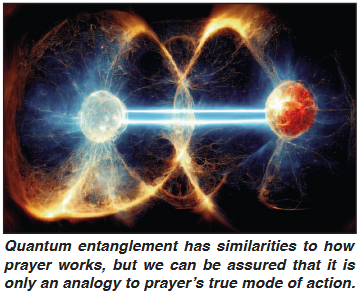 “Entanglement is a strange feature of quantum physics, the science of the very small. What it tells us is that if it is possible to link together two quantum particles, protons of light or atoms in a special way that makes them effectively two parts of the same entity. and then separate them as far as you like. Then a change in one is instantly reflected in the other. It is as if two particles act together. They behave like one object, but remain as two separate objects. A good analogy is two people seated on a seesaw. No matter how long the seesaw is, if one end is down the other end must be up. This happens instantaneously. There are no messages between the two people saying, ‘I’m going down therefore, you must go up,’ and waiting for the person to receive the message. Yet the two people are always connected and behave as one
“Entanglement is a strange feature of quantum physics, the science of the very small. What it tells us is that if it is possible to link together two quantum particles, protons of light or atoms in a special way that makes them effectively two parts of the same entity. and then separate them as far as you like. Then a change in one is instantly reflected in the other. It is as if two particles act together. They behave like one object, but remain as two separate objects. A good analogy is two people seated on a seesaw. No matter how long the seesaw is, if one end is down the other end must be up. This happens instantaneously. There are no messages between the two people saying, ‘I’m going down therefore, you must go up,’ and waiting for the person to receive the message. Yet the two people are always connected and behave as one
“This physical phenomenon of entangled particles, though separate but behaving as one with instant communication between them, throws some light on Christian prayer. The existence of quantum entangled states is evidence that a corresponding situation can exist during Christian prayer, dismissing the skeptical view that it is talking to someone at a distance with no channels of communication.”
Let us dissect this matter of quantum entanglement more closely. Quantum entanglement is a phenomenon in quantum physics where particles become interconnected such that the state of one particle instantly influences the state of another, regardless of the distance separating them. This concept challenges classical physics, suggesting that our reality is deeply interconnected with spiritual, unseen reality.
The connection between prayer and quantum entanglement can be seen through the following points:
1. Transcending distance. Just as entangled particles remain connected across vast distances, prayer transcends physical barriers. It has effects that are not limited by time or space.
2. Intangible impact. Prayer is a declaration of God’s will, which can create real effects in the physical world. This aligns with the idea of non-locality in quantum physics, or actions at one location can influence another instantaneously.
3. Spiritual dynamics. The principles of quantum entanglement can serve as a metaphor for understanding the spiritual dynamics of prayer. When individuals pray, they engage with a force that connects them to God’s power, similar to how entangled particles interact.
The implications of prayer as quantum action can be summarized with the following three points:
1. A powerful tool. Prayer is not merely a ritual; it is a powerful tool that allows believers to align their desires with God’s will, potentially leading to miraculous outcomes.
2. Persistence over persuasion. The effectiveness of prayer may depend more on persistence than on persuading God to act. This reflects the idea that prayer is about engaging with a higher dimension rather than manipulating physical reality.
3. Quantum level understanding. By viewing prayer through the lens of quantum mechanics, we can gain a deeper appreciation for its effectiveness and reach, recognizing it as a means of co-creating with God’s will on earth.
The idea of quantum entanglement still does not provide a very close metaphor with the powers that prayer exerts on the physical universe, matter, or other people’s attitudes and livelihoods, all of which are influenced by prayer. It is an unseen force that has the capacity to change people and events directly and instantly. Elohim spoke the universe, and life forms and mankind on it, through the “spiritual frequencies” which he uttered. It was like a prayer spoken to activate the energy-rich but formless “ether” of space into tangible things, be they spiritual or physical.
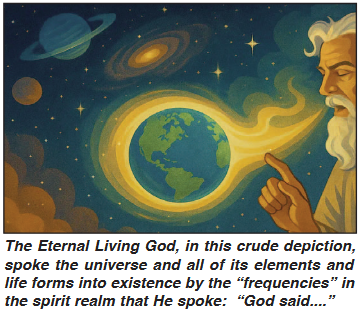 “Then God said, ‘Let there be light …’” (Genesis 1:3).
“Then God said, ‘Let there be light …’” (Genesis 1:3).
“Then God said, ‘Let there be a firmament in the midst of the waters …’” (Genesis 1:6).
“Then God said, ‘Let the waters under the heavens be gathered …’” (Genesis 1:9).
“Then God said, ‘Let the earth bring forth grass …’” (Genesis 1:11).
… and so forth in versus 14, 20, 24, 26, and 29.
said = amar, “to say, speak, tell, command, answer.” According to J. Kohlenberger, III, (The New Strong’s Expanded Concordance of the Bible, Thomas Nelson, 2001), “Often, however, there is a much fuller sense where God’s saying affects the thing spoken of (cf. Genesis 1).”
Kohlenberger’s short explanation alludes to the fact that frequencies or images of God’s mind affect the reality expressed in the formless sea of energy which pervades all of space; i.e., space is anything but vacant, but filled with God’s spirit essence, albeit the only forms seen — elements, planets, stars, plants, animals, etc. — are those manifested through the words of Elohim. This reality is confirmed by Scripture:
“For this they willingly forget: that by the word of God the heavens were of old …. But the heavens and the earth which are now preserved by the same word …” ( II Peter 3:5, 7).
“By faith we understand that the worlds were framed by the word of God, so that the things which are seen were not made of things that are visible” (Hebrews 11:3).
world = aion, “an age, by extension perpetuity.”
framed = katartizo, “fit, frame, mend, complete thoroughly, repair, adjust.”
The world we now see was made from formless energy, or as Dewey Larson makes clear in Nothing But Motion (North Pacific Publishers, Portland, Oregon, 1979) and The Universe of Motion (North Pacific Publishers, Portland, Oregon, 1984), physical matter is manifested by vortices of motion within this sea of energy. Larson postulates that the current concept of a universe of matter is not supported by science, but that motion is the soul constituent of the physical universe. Speaking is frequencies — motion — and thus God speaking matter into existence fulfills the meaning of Scripture. In other words, physical reality is nothing but motion within the unseen energy all around us. For detailed information of Larson’s thoughts, go to www.cosmic-core.org/free/article-112-physics-aether-space-time-part-2-dewey-larson-3d-time/.
 Phil Hotsenpiller goes one step further and postulates that we may be living in a holographic universe, an idea which blends well with Larson’s:
Phil Hotsenpiller goes one step further and postulates that we may be living in a holographic universe, an idea which blends well with Larson’s:
“The suggestion that we live in a holographic universe is no longer the stuff of science fiction. It is a mathematical possibility that upends our understanding of reality. Quantum physics posits those unseen dimensions and spiritual realm — long described in Scripture — may indeed exist. Ecclesiastes 3:11 marvels, ‘He has made everything beautiful in its time. He has also set eternity in the human heart; yet no one can fathom what God has done from beginning to end.’ This convergence of ancient wisdom and modern science compels us to reconsider our conventional views of the universe. It suggests that our faith, prayers, and beliefs may actively shape physical reality as the Bible has long asserted. This raises profound questions about free will and predestination, challenging us to reflect on whether our existence is entirely autonomous or intricately woven into a divine plan” (P. Hotsenpiller, Quantum physics and the Bible, American Faith, December 19, 2024, www.americanfaith.com).
How to be Heard by Our Creator
We can be certain that if we follow the pattern of living that God prescribes for us we will be heard! We must understand who our Creator is as best we can. He is the One who knows our needs even before we ask (Matthew 6:8). The apostle John made clear that if we ask according to His will he hears us, and if He hears us He will answer us (I John 5:14-15).
We need to be in constant contact with our Maker. Enoch “walked with God” for 300 years (Genesis 5:22-24). This word walk in Hebrew is halak, which means “to go, walk, behave,” showing that as he lived his life he followed God’s lawful ways of living. This walking had to involve constant communication with Elohim, prayers being offered up to the Creator.
We can be certain that God’s answers to our prayers will be correct — the very best for us. Even Paul, who asked for healing three times for a thorn in his flesh, was denied that healing for a special reason: “My grace is sufficient for you, for my strength is made perfect in weakness” (II Corinthians 12:9). That thorn led him to glorify God in his infirmities that the power of Christ might rest upon him.
But Paul did not stop there. He went on to say:
“Therefore I take pleasure in infirmities, in reproaches, in needs, in persecution, in distresses, for Christ’s sake. For when I am weak, then I am strong” (II Corinthians 12:10).
Your prayers will be heard if you are doing God’s will and following Jesus Christ’s example of living. They may not be answered immediately or in the way you expect, but they will be answered correctly and in the way that is best for you.
You can be sure that all of the effort you put into a prayer will be returned to you multiplied in terms of peace of mind and soundness of heart. He can also change the course of events for you or for those around you, and even modify the elements and environment for your benefit! Your Creator loves you and desires the very best for you.
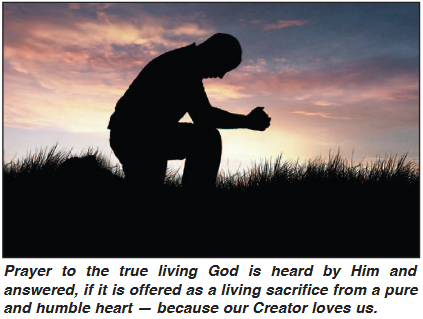 Vain repetition is to be avoided, for God does not listen to those prayers, such as the Catholic Rosary. Christ said, “And when you pray, do not use vain repetition as the heathen do. For they think that they will be heard by their many words”(Matthew 6:7). Do not make a parade before people, praying to be seen of men, for such vanity defeats the purpose of prayer (Matthew 6:5). Rather:
Vain repetition is to be avoided, for God does not listen to those prayers, such as the Catholic Rosary. Christ said, “And when you pray, do not use vain repetition as the heathen do. For they think that they will be heard by their many words”(Matthew 6:7). Do not make a parade before people, praying to be seen of men, for such vanity defeats the purpose of prayer (Matthew 6:5). Rather:
“But you, when you pray, go into your room, and when you have shut the door, pray to your Father who is in the secret place; and your Father who sees in secret will reward you openly” (Matthew 6:9).
I personally like to offer my requests to God within the context of the outline given in Matthew 6:9-13. In fact, Jesus states, “In this manner, therefore, pray.” Most everything you need to request of God can be fit into these categories, though spontaneous prayers in whatever order will be heard just as well by the One who knows your every thought:
“Our Father in heaven, hallowed be Your name.” Show your reference to His holy name and recognize Him as your true Maker.
“Your kingdom come.” Ask that the government of God be established on the earth very soon, and that Jesus Christ will return to resurrect the saints and establish the Kingdom.
“Your will be done on earth as it is in heaven.” Request that the reality of the heavenly realm in all of its glory will replace the present culture of deception, carnality, and greed fostered by the Devil.
“Give us this day our daily bread.” Supply the needs for today of food, clothing, shelter, transportation, work, friendships, and every other need we might imagine.
“Forgive us our debts as we forgive our debtors.” Forgive financial debts of others as circumstances permit, and especially forgive others of any troubles they may have caused you.
“Do not lead us into temptation, but deliver us from the evil one.” Ask to be relieved of any difficulties that Satan might throw at you, and to not be tempted by him more than you can endure.
Besides these issues, I pray for healing of the many who are afflicted, and to relieve the distress of those under heavy burdens. Strive to ask God to intervene for the sake of others even as you would have others intervene for you.
Pray without ceasing. Prayer is your lifeline to your Creator, who holds the keys to eternity for you! There is no wasted time in prayer; it “avails much”!

